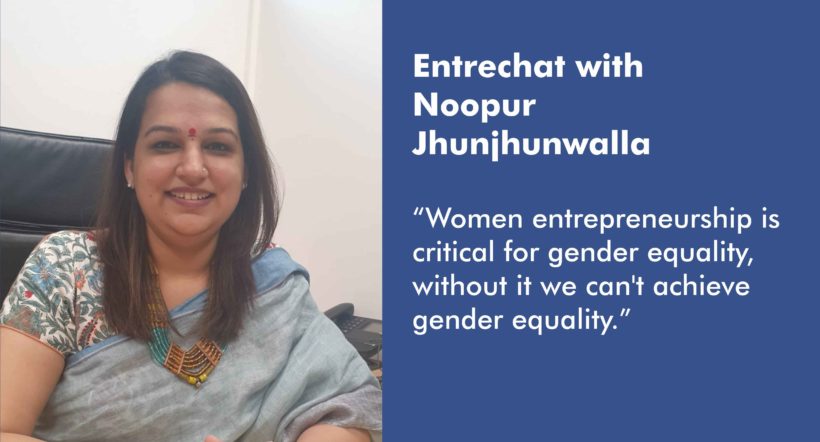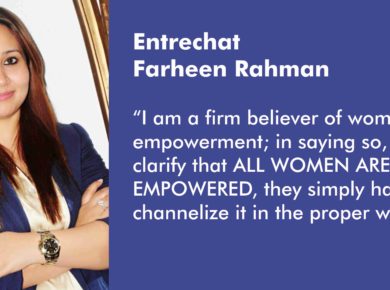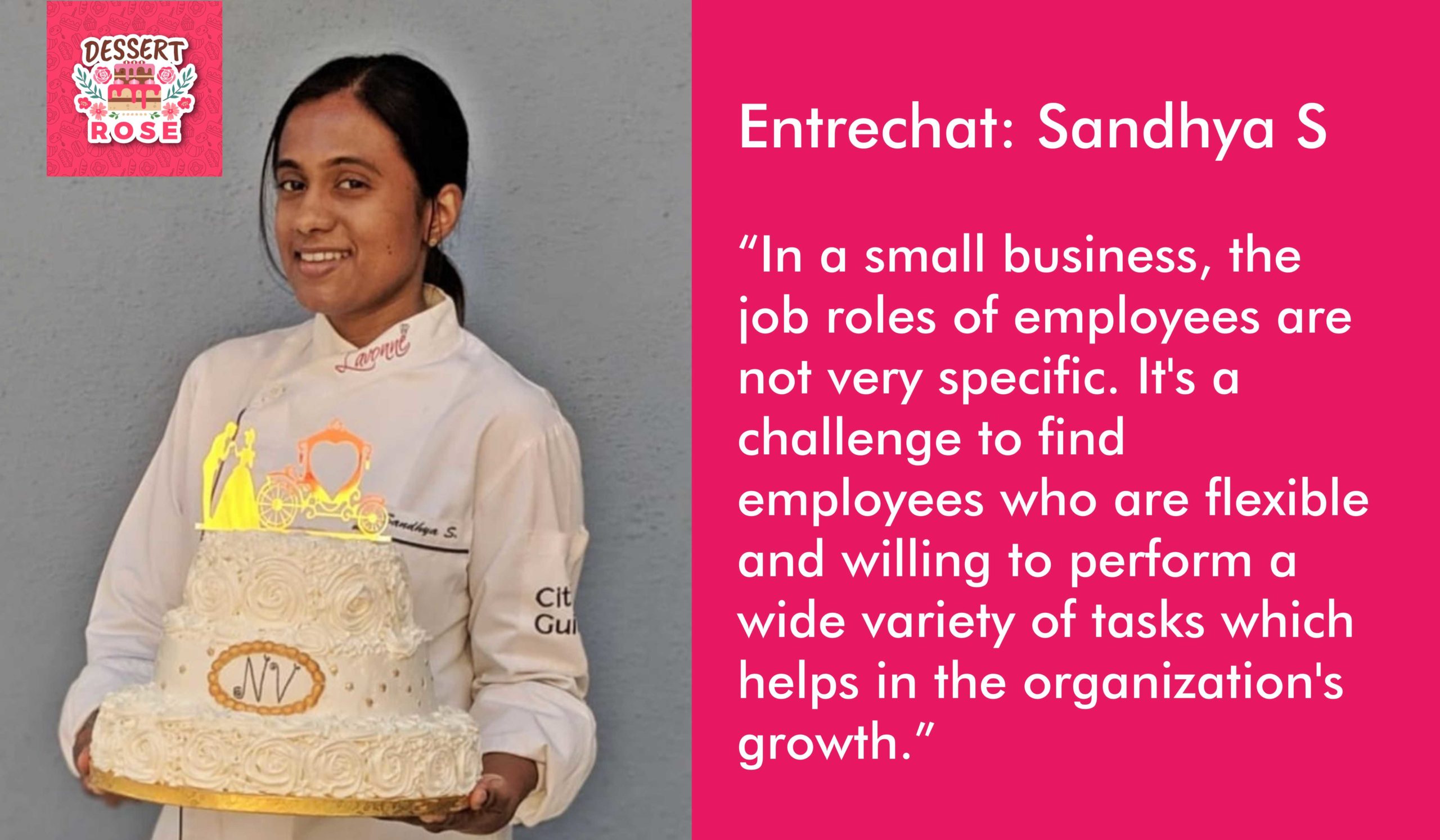“Women entrepreneurship is critical for gender equality, without it we can’t achieve gender equality.”
The first podcast in the She Diaries series, will bring you face-to-face with prominent voices from the community of business women. This podcast is under the banner – HT Smartcast.
Here, you can catch Ms Ruby Sinha, Managing Director- Kommune Brand Communications and Founder- sheatwork.com in a conversation with Ms Noopur Jhunjhunwalla, Monitoring, Evaluation and Partnership Lead, UN Women (India Office).
RS: In tune with your experience of working with women globally, what are your views on women empowerment?
NJ: Women entrepreneurship is critical for gender equality, without it we can’t achieve gender equality. We must be cognizant of the fact that this is a very important year for us as it marks 25 years to the Beijing platform for action, which is the first time the world came together to commit to gender equality and women empowerment. It was the first time that we vocalized and accepted women rights. We still have a large gender gap in the world. 1 in 3 women still continues to experience physical or sexual violence in their lifetime; on an average 137 women are killed by a member of their own family every day; in 18 countries, husbands can legally prevent their wives from working and in 39 countries daughters and sons don’t have equal inheritance rights. So on an average women earn 20% less than their male counterparts and only 6% make it to an executive role.
We have made a lot of progress, but there is still so much left to do. There is not a single country in the world that can claim to be gender-equal today. We are taking steps, but the pace is slow and we need to accelerate it forward. The next generation is the generation for equality; that’s what they demand and we should be enabling that!
RS: Those are grim figures that you’re portraying for us. How important is the role of various stakeholders in creating a robust ecosystem for women entrepreneurship?
NJ: It’s absolutely critical. India is, for example, legislatively a very progressive state but our gender stereotype is deeply engrained in our being and normalized every day that it’s really about that behavioural change. It’s about you and me walking in our own little silos; we must work together collectively, whether it’s for women or women entrepreneurship.
Recently, there have been a number of studies on the impact of COVID-19 on women-owned businesses. A recent study by us at UN Women has highlighted that women are asking for this holistic approach – they need access to finance, to investments, contract opportunities, business training, mentorship and networking. These are very critical for them and we can see a lot of gaps within the eco-system. If you look at the financial structure, a recent IFC report on female-led startups or any organization with 1 female founder is likely to get disproportionately small amount of global venture funds. In 2018 it was reported that only 11% of seed funding and 5% of late-stage venture funding in engaging markets went to women. This is a bit scary, because we know from experience and many studies that women are prudent with money and tend to create better profit and returns on investment. Globally, public procurement spending generates 15 to 30% of the GDP of a country and, only 1% goes to women! So, we know that 34% of companies that have diversified supply chains actually create positive impact of their profitability; and in fact, in 2014, AT&T attributed 4 billion of their revenue to engage women suppliers. It’s not that you want to work with women because it’s a feel-good thing; it actually makes good business sense! And, that’s why the whole eco-system needs to work – whether it’s your investors, venture capitalists, angel investors, accelerators and incubators who are helping; whether it is the banking system or the Mudra loans that the government is promoting. When you go to the ground, the manager will still need those extra documents for a woman. Recently, we had a case when 2 founders of a women-run entrepreneurship (they owned the land and the business was in their name) and when they wanted a loan for COVID-related expansion, and approached a bank, under the Atmanirbhar Bharat scheme, the manager refused, saying that it would not be possible unless they got an NOC from their husbands! This is not a requirement.
It’s really not about just addressing the gaps, but it has to be an eco-system approach, where we work with multiple people across the board, with various stakeholder groups and bridge those gaps, which are often soft – it’s informational, biases, or lack of access! We are seeing that more and more investors interested in diversifying their portfolios are looking for women to invest in. And, yet when we talk to women, they say that investors are not interested in their ideas because they don’t think that it’s commercially viable. So, we are working towards bridging this gap as well – to enable a woman to pitch better for an investor.
We also see biases – a lead woman VC told us that while making a pitch people don’t look at her in the eye, but focus on her colleagues who are junior, because they don’t think that she is in the decision –making role! That is unfortunate! We would expect these biases not to exist, but this runs deep across the strata of society. That’s what is required when you look at the eco-system approach.
RS: Women’s economic empowerment plays a key role in achieving gender equality and contributes to overall economy also. What are some of the measures taken by UN Women to help women achieve economic empowerment, especially in terms of women entrepreneurship in India?
NJ: According to McKinsey’s global study, $12 trillion can be added to global economy by 2025 , by advancing women equality. When we are in this downturn, it’s also necessary that women become a part of that recovery and are not further marginalized. At UN Women, we work across areas of women economic empowerment, where we look at a holistic perspective. It’s not about skill training, it’s also about addressing issues of violence, mentoring and leadership roles that organisations can take and it’s also about enabling behavioral change and breaking stereotypes. We have a few programmes which are quite strong that we are working on. Globally UN Women has come up with 7 women empowerment principles which are the guidelines or a framework for an organization to become gender equal. It ranges from how to get diversity at the workforce, how to create more equal supply chains to the way we are designing our products and dealing with safety. We are working closely with the private sector on adopting these principles. We have many organizations that have signed up like – Biocon, Tata Power, Campgemini – to name a few.
We also have a programme called the ‘Second Chance Education Program’ where we work with rural enterprises in Rural India across 4 states with women, who have dropped out of the education system for various social reasons like early marriage, lack of resources and, now they want to get back to the workforce. We are working to complete their education, to skill them and also help them build their enterprise. Recently SBI and the World Bank announced a scheme for women livelihood, where we are seeing a lot of women are transitioning from self-help groups to scale into individual enterprises that require Rs 10 lakh loans. So a special scheme that will give competitive interest rate based loans to women, who can grow their businesses is critical. It’s a missing middle now.
Moreover, we have an investor consortium along with our sister agency UNTP and NITI Aayog. The consortium consists of investors who invest in various stages – from angel to debt, and we work with women and train them to make successful pitches to investors. We have been doing this for over a year now and we are seeing great results!
And, we are doing innovative stuff like the Industry Disrupter Challenge and recently had Sri Shakti Challenge with the government of India, where women can innovate and find solutions to challenges posed to them. In the Disrupter Challenge, it was focused on sustainable fashion and we created a linkage between women entrepreneurs and the industry which included names like H&M, who incidentally are working with a large % of women entrepreneurs and their feedback have led to solutions that they been struggling with. We didn’t realise that there is so much innovation out there!
It’s critical we work on an intersectional, innovative approach. So, where we work with women, we also deal with how they work around their household burden.
RS: In the current scenario, the WFH reality is coming across as the new normal, so will there be a growth of women entrepreneurship, because now she can sit at home and run her business?
NJ: I think it’s a double-edged sword. Technology has provided a lot of opportunities to join the workforce and scale business too. A recent study says that women are facing many challenges from the WFH mode, because they don’t have the tech knowhow, as almost 60% told us. Almost 51% reported that the household routine has been affecting productivity of women employees and 70% had to quit because dealing with children and husband’s schedules came in the way, and added to this were old parents and the elderly who needed care.
On the flip side, 70% said that they are getting some sort of support from the social support system – from friends, family, advisors, mentors – on how to run their business in the pandemic. Yet, the number of people who reported this was very minimal. So, we have this deep-seated patriarchy in our society, where it’s ok for women to work, but she also has to take care of all household work! That is a challenge, but it is an opportunity to change this as well! We are seeing more home-run businesses getting access to e-commerce, and they are growing. Many e-commerce companies have told us that this has given opportunities to hire women in Tier 3 and 4 cities with lower cost and higher productivity, which otherwise they would not have been able to do. They are able to use technology to deliver their back-office operations as well – inventory management, cataloging etc; they are also seeing ne distribution models emerging. We need to be cognizant of the risks – there are stories of violence and pressures. Since it’s new, we need to develop a protocol in place as well. These complexities will resolve but it’s a great opportunity for women who have been dropping out of the eco-system.
RS: It’s more ‘worklife integration’ than ‘worklife balance’. In this context, what are the biggest challenges for women entrepreneurs?
NJ: I think it’s clearly that women are asking for support in terms of market linkages and technology – multiple studies have shown us this. 75% reported women are looking for new business opportunities. To me it gives hope – women are not giving up, and they are still committed and we should empower that.
Talking of the eco-system, we are all adapting to a new normal, which opens up an opportunity. Whether it is technical linkage to work from home, or e-supply chain or e-commerce set up, or mentoring – there are many ways to do it. We need to create that enabling environment.
RS: What would be your advice to women entrepreneur professionals, based on your journey?
NJ: Stand up, speak up and ask. You don’t need to accept the reality that world has given us. Unless you do it together collectively, you will not make progress. Don’t give up. It’s difficult, but it will get better!










